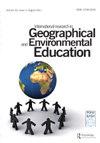Exploring landscape preference through photo-based Q methodology. Madrid seen by suburban adolescents
IF 3.1
Q2 EDUCATION & EDUCATIONAL RESEARCH
International Research in Geographical and Environmental Education
Pub Date : 2020-08-26
DOI:10.1080/10382046.2020.1804134
引用次数: 6
Abstract
Abstract The needs and group practices of adolescents have great impact on public spaces. Further understanding how and why they value certain environments is instrumental to better integrate their perspective in the design and management of our landscapes, as well as in raising environmental awareness and fostering sustainable attitudes and practices. We present the findings of a workshop on landscape preference carried out with a secondary school in the suburbs of Madrid. With participants between the ages of 11 and 16, photo-based Q methodology in combination with qualitative data allowed for the identification of groups sharing similar viewpoints, general trends, as well as exploring the structure and meaning behind consensus and disagreement photographs. Findings show overall positive valorisation towards green spaces, especially those where urban greenery is combined with recognizable architectural elements. Familiarity with the landscape type seems to encourage positive rankings, and preference towards well-known cultural sites manifests at older ages. Among the wide array of photo-elicitation techniques devoted to the assessment of landscape preference, photo-based Q methodology has seldom been used. However, this intuitive, effective, and inexpensive technique can be carried out in short and enjoyable sessions, showing great potential to be applied in geographical and environmental education.通过基于照片的Q方法探索景观偏好。郊区青少年眼中的马德里
青少年的需求和群体实践对公共空间产生了巨大的影响。进一步了解他们如何以及为什么重视某些环境,有助于更好地将他们的观点整合到景观的设计和管理中,以及提高环境意识,培养可持续的态度和做法。我们介绍了在马德里郊区的一所中学开展的景观偏好研讨会的研究结果。参与者年龄在11到16岁之间,基于照片的Q方法与定性数据相结合,可以识别具有相似观点的群体,总体趋势,以及探索共识和分歧照片背后的结构和意义。研究结果显示,绿色空间总体上是积极的,特别是那些城市绿化与可识别的建筑元素相结合的空间。对景观类型的熟悉似乎会促进积极的排名,对知名文化遗址的偏好在年龄较大时表现出来。在众多致力于景观偏好评估的照片激发技术中,基于照片的Q方法很少被使用。然而,这种直观、有效和廉价的技术可以在短时间和愉快的会议中进行,显示出在地理和环境教育中应用的巨大潜力。
本文章由计算机程序翻译,如有差异,请以英文原文为准。
求助全文
约1分钟内获得全文
求助全文
来源期刊

International Research in Geographical and Environmental Education
EDUCATION & EDUCATIONAL RESEARCH-
CiteScore
5.20
自引率
33.30%
发文量
11
期刊介绍:
International Research in Geographical & Environmental Education publishes quality research studies within the context of geographical and environmental education. The journal endeavours to promote international interest and dissemination of research in the field, provides a forum for critique, and demonstrates the relevance of research studies to good professional practice.
 求助内容:
求助内容: 应助结果提醒方式:
应助结果提醒方式:


